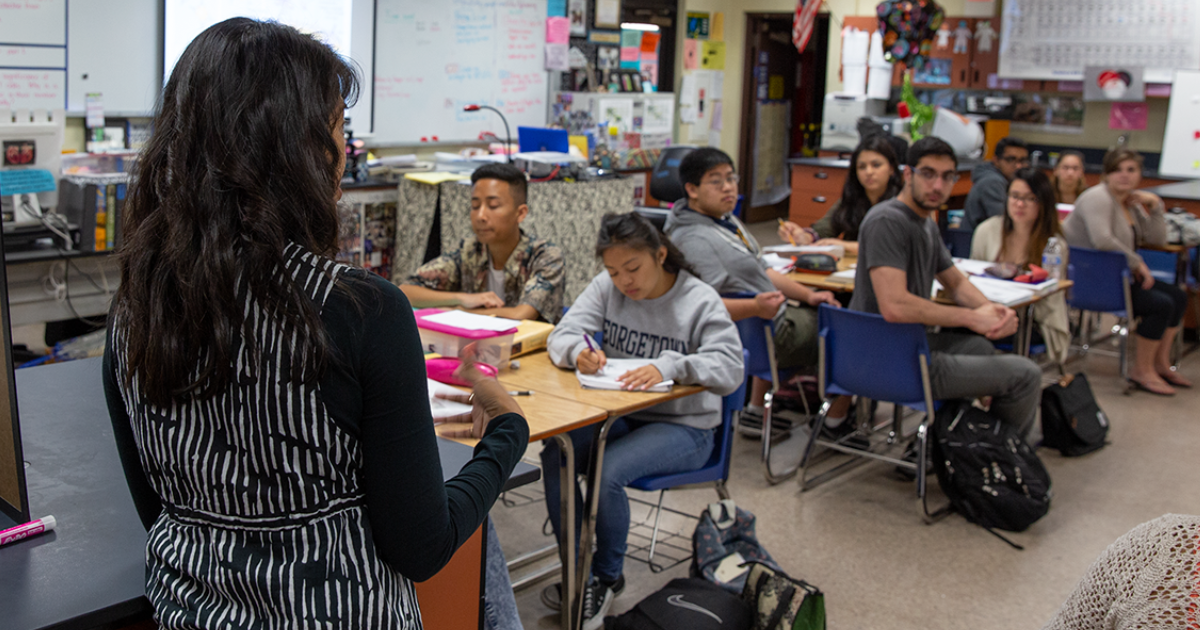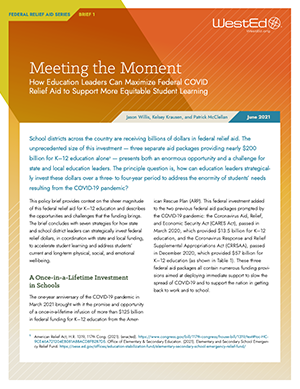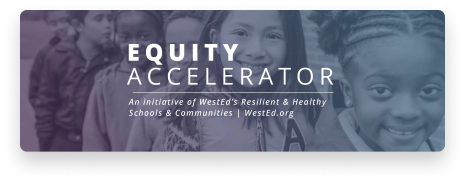Equity
Striving to achieve equity is integral to WestEd’s mission

Our work is aimed at supporting diverse learners of all ages to successfully achieve their dreams. Equity is reflected in everything we do, from coaching and technical assistance to research and evaluation to product development. We operate with a particular commitment to populations that traditionally have been inadequately served or unfairly treated. Our staff partner with clients and others to reduce systemic inequities, eliminate opportunity gaps, and foster equitable opportunities and outcomes through all we do.
We believe that equity is most effectively achieved by teams that are diverse and inclusive, that reflect the communities we serve, and that generate bold solutions to our most challenging issues. In our external work, we are specifically committed to the following:
- Illuminating and addressing disparities by identifying and working to resolve inequities within the systems in which we work
- Valuing and elevating the diverse voices—including the knowledge, expertise, capacity, and experiences—of those with whom we work, particularly people of color and those from other historically marginalized groups
- Ensuring equitable access to WestEd-developed resources and services for diverse communities, including those who traditionally have been underserved
Defining Equity
WestEd staff developed the following definition of equity to foster a shared understanding of what it means to work toward and achieve equity—in our fieldwork and within our own organization:
Equity is the attainment of comparably positive outcomes for all groups within, or served by, any complex system through implementation of policies, practices, and procedures that remove systemic barriers and provide the supports needed to ensure everyone’s full and successful participation in the system. Equity exists when race, ethnicity, language, religion, gender identity, sexual orientation, age, national origin, physical or cognitive ability, socioeconomic status, and other such characteristics are not predictors of outcomes for any group or the individuals in it.
Subscribe to the E-Bulletin for regular updates on research, free resources, services, and job postings from WestEd.
Examples of Equity-Focused Work at WestEd
Our equity work addresses systemic inequities, elevates diverse voices, and ensures equitable access for all learners. Below are a few examples, including our work to guide anti-racist evaluation strategies and a newly launched service to help districts develop and implement anti-racist, equity-focused policies and practices that lead to transformative, systemwide change.
Resources
Anti-Racist Evaluation Strategies: A Guide for Evaluation Teams
This guide was developed to help evaluation teams increase their awareness of racism in evaluation and to employ strategies to conduct anti-racist evaluations.
Sound Basic Education for All: An Action Plan for North Carolina
Informed by extensive research conducted by WestEd, this multiyear action plan provides recommendations to advance North Carolina’s efforts to promote equitable outcomes for all learners.
Strategic Use of Federal Relief Aid to Support More Equitable Learning
This series of policy briefs describe how to allocate unprecedented levels of relief aid to ensure that students facing the highest barriers to learning receive the support they need to succeed.
Understanding the Experiences of LGBTQ Students in California
Drawing from one of the largest data sets in the nation, this study describes how LGBTQ students perceive their school climate and how those perceptions relate to their academic success and emotional well-being.
This study investigated discipline and achievement gaps and found that, across racial groups, students who had greater exposure to restorative practices experienced less exclusionary discipline and better academic outcomes.
Projects
COVID-19: Accelerate Learning Recovery
Knowing that vulnerable populations are often impacted the most by COVID, this WestEd collection of services and guidance to accelerate equitable learning opportunities and better outcomes.
As part of the COVID Education Equity Response Collaborative, this yearlong project supported select county offices of education to cohere around a vision of equity, address biases, and implement culturally responsive and inclusive practices.
Services
WestEd’s systemic equity reviews help education agencies engage in an intentional process to address beliefs, policies, and practices and implement culturally responsive recommendations and goals.
Quality Teaching for English Learners (QTEL)
Quality Teaching for English Learners (QTEL) offers educators rich professional learning opportunities that are designed to expand theoretical and practical knowledge, develop expertise, and promote the kind of quality teaching and student engagement needed to ensure English Learners’ success.
Special Education Program Review
We collect and analyze information that assists districts in gaining a deeper understanding of their efforts to educate students with disabilities and build a dependable, efficient, and cost-effective system that produces positive outcomes.
National Centers
Center to Improve Social and Emotional Learning and School Safety works to expand the knowledge and capacity of the field to integrate evidence-based social and emotional learning and school safety practices and programs to support students’ success throughout their K–12 experience and beyond.
The National Center for Systemic Improvement (NCSI) provides technical assistance to help state education agencies to best use their general supervision and professional development systems to establish and meet high expectations for every student with a disability.
The National Research and Development Center to Improve Education for Secondary English Learners leads the development of an actionable and powerful portfolio of work to ensure access to rigorous grade-level content and promote success for English Learners in communities, colleges, and careers.

















